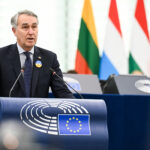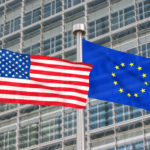What does Russia’s invasion of Ukraine mean for the future of EU foreign policy? Experts discussed this question at Strategic Intelligentsia‘s Gulf Futures Forum. Read what they had to say.
Helga Trüpel: What do you think about the Western democracies’ response to Putin’s act of aggression? Should it serve as a blueprint for relations with other regions such as the Gulf?
Elmar Brok: The European Union is a success story. It is economically strong. The European internal market is the biggest, most successful internal market of the world. We have a gross national product like that of the United States. We are the biggest trading power of the world. Member states give 60 percent of the development aid of this world and 70 percent of humanitarian aid in this world. In soft power, the EU is very strong. But we have seen lately that soft power does not bring us to the table of negotiations for war or peace.
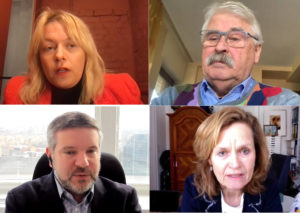
Jane Kinninmont. Elmar Brok, Alan Mendoza and Helga Trüpel
German Foreign Minister Annalena Baerbock said, “Someone who talks does not shoot”. But we have to complete that sentence. You have to be strong enough in order to talk successfully. The European Union and its member states are too weak to play a role when it comes to hard politics. But this is our own fault, it is not a question of money. EU member states spend three times more money for military than Russia, but every country does it on its own. We have no cooperation. Member states have 160 weapons systems while the United States have 25. That is a lack of synergy. We have to totally change our structures for a closer European cooperation. All our armies should come together. Not just in planning but also in procurement. Currently, for example, we have no possibilities between armies to have a complete communication system.
“Soft power does not bring us to the table of negotiations for war or peace” – Elmar Brok
My second point is we have to come to majority voting in foreign, security and defence policy. Or at least make it possible that coalitions of the willing can be active in the name of the European Union. In Germany, for example, it is a turn-around for the government to spend 100 billion euros for defence. Yet it would be a disaster to do it the same way as it was done in the past. The money would go down the drain. An old Roman saying is, “Prepare for war in order to keep the peace”. There is some truth in that, unfortunately.
Jane Kinninmont: This war has shocked many people in Europe. Clearly, it has also shocked many people in Russia. The dominant view among the Russian think tankers and journalists was that Putin was making a big show of force on the Ukrainian border to get diplomatic concessions. But it seems very few people inside the Russian system knew what was coming. I think there will be quite profound consequences, although they it is hard to foresee what will be the internal balance of power within Russia.
Meanwhile, although Europeans are very shocked that there can be today an inter-state war, people in the Middle East have this very different perspective because they are living with conflicts. In some ways, what Putin has done is not unlike Saddam Hussein’s invasion of Kuwait. It is very similar in terms of the rhetoric, i.e. that it’s not a real country and using an old border dispute to justify its actions. But in that case, there was a very clear international reaction. The UN was able to act and the invasion was reversed, the occupation was ended.
Today in the Middle East, Kuwait may be the country that is most supportive of the Arab League actually taking a position to defend international law because it’s had that experience itself. But unfortunately a lot of élites in the Middle East are thinking that people don’t react enough when this happens to them which justifies that they wouldn’t need to take a clear stance.
We cannot put a Cold War templates onto the Middle East. The conflicts are much more complicated. It’s not one aggressor versus everyone else. There are many players. Sometimes they act together in one country and an opposite side is in another country. It is complex. But something that is quite concerning for Western countries is that those countries that are very closely aligned with the West are at the moment very reluctant to stand up to Russia and condemn what it’s doing. A lot of it is because countries in the Middle East have been living for a long time with this concern that is growing in Europe. What if US turns inwards for the long term and it is isolated and we need to rely upon ourselves?
Even the countries in the region that have been the best friends of the US – the Gulf Arab monarchies and Israel – are nervous about how much they can rely on the US. They are quite comfortable with a multi-polar world because, at the end of the day, they don’t want to depend totally on anyone external partner. They would rather have a few friends and maybe they can play them off against each other. The US has been for them the Number One security partner. China has been the growing trade partner. Finally, Russia has other uses, including to cooperate to keep the price of oil high, to provide some weapons here and there, and to say to the Americans that there other friends who do not care about human rights.
"Europe can only get its strength back by combining forces in the security and defence policy"
"We should explain this to our people in a proper way. We haven't done so. Even if it is not popular"
Elmar Brok at EU Watch panel debate@elmarbrok
— EU Watch (@EUWatchBrussels) March 9, 2022
So, this multipolar world has been quite comfortable. Now the countries in the region are wondering if are they going to be pushed to choose. Some of the regional players are doing something that is quite rational, i.e. trying to put themselves forward as potential mediators. For example, Israel, which we saw with Prime Minister Bennett in the last four speaking to Putin and Zelensky. That is what Saudi Arabia and the United Arab Emirates see as desirable. But it’s not completely comfortable for the US and Europe so far because what is coming out seems to be closer to the Russian position than the western position. There needs to be some quite heavy engagement with these countries to say nobody wants a cold war cross the Middle East and nobody wants a Cold War to generate a hot war against the Middle East.
“We cannot put a Cold War templates onto the Middle East. It’s not one aggressor versus everyone else” – Jane Kinninmont
However, whatever your views about democracy, whatever your views about the West, we cannot live in a world where invasions are a legitimate way of gaining territory. Because the potential for that to fuel further wars, including in the Middle East and including in Africa is really high.
Alan Mendoza The Chinese are playing a very interesting game in the Ukraine crisis. We are not certain of whether they were aware of the specific details or terms of what Putin was intending to do. But we already know the American shared intelligence about what Putin was doing. They saw the troop buildups, and there clearly would have been some discussions given the closeness between the two countries and the fact that the leaders have met a couple of weeks beforehand. China has this history of not liking interventions. However, there are many commonalities between what the Chinese and Russians would like to do in the sense. If Russia is upturning the international system, China is very much in the league of wanting to do that as well.
Anything that takes down the West is a good thing for both Russia and China. It’s quite clear the Chinese aren’t necessarily upset about what the Russians had been doing, in the macro sense at least. In the micro sense, there is some discomfort, hence their abstention. But the Chinese have also used this as a kind of sandbox experiment for what they might choose to do in the future. It is a scarcely kept secret that the Chinese have wanted Taiwan back for many years. The Chinese might be interested in seeing how this whole crisis plays out in order to use the Russians as a game theory version of what they might one day do themselves in Taiwan.
Really enjoyed this discussion yesterday with @ElmarBrok_MEP, @alanmendoza & @HelgaTruepel. This point about talking to dictators from a position of strength is a deep one—not only about military strength but economic, social, political strength and self-confidence https://t.co/lflbIDP4tb
— Jane Kinninmont (@janekinninmont) March 10, 2022
How far will the Europeans, Americans, and also Japanese go? How far will the international community take opposition to this? Will this eventually become military? China has been as shocked as Russia about the degree and the speed of the global response to this in terms of sanctions an in terms of diplomatic pariah status.
At what point do the Chinese then decide to exert pressure? The fascinating point about Putin’s strategy is that he is essentially cutting himself off from the West. It means he has to turn east now. There’s a lot of obvious concern in Russia about China’s true intentions towards Russia. There are all these fears within Russia that the Chinese might seek to take advantage and actually grab some of Russia for themselves. some point say, right. The Chinese would love to come out of this with a great diplomatic win as they have had a very bad press over the past years with Hong Kong and the pandemic. There may be something down the line where they do end up serving for their own purposes as mediator and trying to stop the conflict.
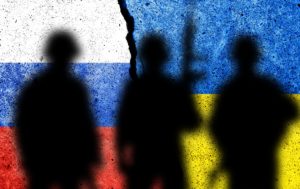
Photo: Shutterstock
Helga Trüpel: Could the EU, from now on, start doing its own security policies independently from the US and NATO?
Elmar Brok: Putin said last summer, and he said it before that, that he wants to build again the old empire. We should read more what dictators write and take it seriously. We used to believe that it would not happen. But what we need to keep in mind is that Putin is not interested in costs, but only in the place he will take in history. That is what makes him so dangerous. Regarding freedom, Russians themselves do not know that their country is in war. It is forbidden to say so in Russia. Dictators should be taken as dictators.
Jane Kinninmont: European countries, especially France and Germany are now taking very seriously the question of strategic autonomy. Can Europe have a collective defence that is separate from NATO? What would happen if another shock to European security happened in the future and the US didn’t care or didn’t want to support it? For years, the US have been saying they want to pivot to Asia and be less involved in Middle East, respond in a way that is more muted. The EU does not want to be relying on the US with the uncertain changes is presidency. The security rule at the US’s played in the world is going through a major transition.
“Putin’s strategy is that he is essentially cutting himself off from the West. It means he has to turn east now” – Alan Mendoza
Alan Mendoza: In 1991, the historian Jacques Poos said “This is the hour of Europe”. Of course it turned out not to be it. The Europeans were not able to solve the Balkan crisis. Europe has struggled to find its role in security policy since that time. Europeans overnight realised that hard power is very much necessary in order to handle security. Germany has now basically overturned their entire post-war policy on lethal weapons. There has been a massive governmental shift that took place in a very short period of time to get to that position. That may presage a whole new role for the EU internationally.
"The Iranians' first priority is always to keep their regime going"
"We should force this regime to comply and bring it to its knees"@alanmendoza at the @EUWatchBrussels panel debate on the EU and the Middle East
— EU Watch (@EUWatchBrussels) March 9, 2022
The problem that the EU always faces is the debate about sovereignty versus supra-sovereign nationalism. It is difficult for countries to give up their military and decide en masse on a common policy. It is even more difficult regarding foreign policy that some of them won’t want to agree with and much more difficult. For the EU to develop its capacity in this regard, it might need to move to a system, not of majority voting where everyone is forced to come along, but majority voting where those who are part of it are able to act rather than not be able to act. It won’t get unanimity on some of these issues across all its member states, but that shouldn’t stop many of the EU countries acting collectively to make a difference in areas of the world where the EU.
If we do want to fight for the values of the EU and others, we have to literally be prepared to fight for them because we don’t do that. The free world is shrinking not growing right now and that requires all of us who value the free world to work out new ways that we’re going to reverse that decline firstly and once again increase that space. The EU historically has had a very good role in democracy promotion in terms of actually building up the nuts and bolts of these things. To deal with how you can help bring people to democracy through military power.
Helga Trüpel: How should we deal with Iran? Should we sanction Iran much more heavily than we did before? Should we talk to dictators?
Elmar Brok: The European Union cannot be a mediator regarding Iran and dictatorships. We must stand on certain positions while the rest of the world rubbles. The main issue with Iran is the bomb. If Iran had a bomb, it would dominate the whole Arabic world. If Iran has it, other countries such as Saudi Arabia will also want it. The mullahs have also problems at home because they cannot feed their people anymore. I hope that we can avoid the bomb via negotiations, which at the moment look like they are on a good track.
Jane Kinninmont: I agree on the importance of making sure that Iran does not get a nuclear weapon. I think what we see in Europe undermines why that is so important. It’s not only about the risk of nuclear war, it’s the fact that countries with nuclear weapons can basically use those weapons for political blackmail. Nobody wants a direct fight between nuclear powers. The West has tried isolation and supporting regime change in Iran for 40 years without getting effective results. The sanctions have been effective in one case only, which was to secure the JCPOA.
Noteworthy dynamic of #Russia’s negotiator retweeting comment from #Iran’s MFA likely responding to the WSJ report today about potentially pursuing an agreement without Moscow. pic.twitter.com/MfiR9bYlzc
— Jason Brodsky (@JasonMBrodsky) March 13, 2022
If the view was to isolate Iran because it’s a dictatorship with poor human rights record, it would undermine the nuclear deal without necessarily getting any benefits. Militias in the region are gaining strength because of political problems and conflicts in Lebanon, in Iraq, in Syria. Although the EU doesn’t have the hard power, it does have institution building capacity that can help on the very long term.
Oil is a big question where the Gulf Arab states are being pushed to do something they’re not very comfortable with. They can, especially Saudi Arabia, increase oil production and help take the economic pressure off oil importers after the embargo on Russia. So far, they haven’t done it and have decided not to change production.
Alan Mendoza: We could get more oil pumping from the Middle East which would obviously alleviate some of the problems. But it is in their interest to keep the flow low and prices high. But ultimately, we need to reduce our dependency on all these sources. The Middle East is unstable as well, it has problems of governance, problems of human rights potentially disrupting supplies. We have to either develop renewable as quickly as possible to get out of there, or find alternative solutions that are not dependent on the whims of despots of various kinds in order to safeguard a national security.
The original Iran deal was a terrible mistake. When Iran was on its knees economically with a very concerted sanctions regime around the world, Barack Obama, threw them a several billion dollars lifeline. They would have come to the same table and come to the same conclusion without having to give any of this stuff away. That deal was not about stopping but about pausing Iran’s programme. The French were not in favour of that specific deal but were told strongly by Obama to sign it. Europeans have seen the US leaving the deal under Trump and then provision after provision of that deal being broken openly by Iran. The Eu has seen how that deal has been torn up in front of its eyes, and has done nothing about it which sends a message to Iran that it is weak.
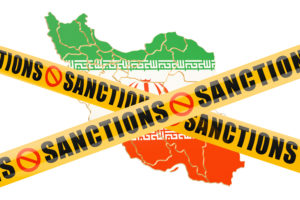
Graphic: Shutterstock
The EU is now concentrating on Russia and will probably make the mistake to flush Iran with cash again. But, today, Iran is far more advanced than where they were back in 2016 so the EU is simply rearming a State that will not use its money to benefit its people but will instead use it to fund all the foreign terrorist activities that have destabilised the region for the past two decades. I would prefer, if there is to be a deal, for it to be on the terms that were muted from the British integrated review: a regional deal involving more than just a nuclear side.
Helga Trüpel: Is the Commission ready to embrace that change? How can it help European citizens when we all have a different mindset? How do we get a lot of people who are hesitant and reluctant to get on board?
Elmar Brok: In 2014, after the Russians took the Crimea and started the war, I was invited by Bush senior in Texas to celebrate with him the 25th year of the fallen Berlin wall. He said “Be strong, show that you’re strong and then talk, talk, talk”. We never had more disarmament and agreements than under Reagan. Never before, never afterwards. When you want to talk to a dictator, he must know that you are strong and only then do you have a chance to come to peaceful solutions. This the reason why we never give up talking.
Jane Kinninmont: I think European attitude will shift as they see that war is something that is about potentially fending off aggression rather than intervening in a faraway country for uncertain outcomes. Problems are going to come up looking at the fiscal costs because, for all governments, the recent disruptions and crises are all pointing to higher spending. Public health on the long term because of lung complications of Covid, kids that need to catch up from school, and potential increased defence spending. Young people have seen the States behaving in a more dramatic way in their life span, and will also be expensive for social support.
Regarding the JCPOA, I don’t believe it is UK policy that there should be a larger deal instead of the JCPOA. The line from the UK leadership has been to get back into the JCPOA and use that as a building block for a larger regional agreement. Iran has behaved quite rationally regarding the JCPOA. Put the nuclear programme on hold and adopt the most stringent inspections regime ever seen, in return for sanctions lifting and economic benefits. They stopped getting the economic benefits and it became clear Europe couldn’t provide them without the US. So, after about 18 months, they started to go back on their own commitments very transparently
Alan Mendoza: It would have made more sense for everyone to deal with the regional issues within the framework because that’s where the collective power is. Iran ultimately has shown itself to be a rational actor when confronted with the option of losing the regime. We saw it clearly when Qassam Soleimani was killed. The Americans took out the lead terrorist in chief of Iran’s infrastructure and the closest people to the supreme leader in the regime expected retaliation. But it did not happen because they were told explicitly that if they harmed any Americans, the US would retaliate heavily and they would all end up in coffins. Iran responds to pressure rationally so all we have to do is turn up the pressure, not come to some ridiculous agreement with them. Nobody in their wildest dreams would imagine that Iran post nuclear deal would still be any less aggressive, any less meddling, any less manipulative, any less dangerous than it is today under the current regime. And you need to change its behavioural because frankly, it is a rogue state.
Elmar Brok: Germany should give a good answer to Macron’s speech from a few years ago at the Sorbonne. European member states need to join each other in a strong foreign security defence policy, to win their sovereignty back, and then combine it with soft powers. We should explain that to our people properly which we have not done yet. We have to show all the implications. Politicians must do it even if it is not a popular question. People nowadays are ready to take on higher prices to support Ukraine. Citizens have more courage than politicians.
Jane Kinninmont: A question has been raised about the invasion of Ukraine being a violation of the UN Charter and NATO should not only be about defending its members. Is the EU only going to promise Ukraine might get accession, but actually this is going to ramble on for years and never make any progress? The EU’s primary route seems to be accession talks but actually, the appetite for expansion also seems to be very limited. So what are the other arrangements that the EU can make with neighbours that does afford them protection and support and greater prosperity, rather than making very distant promises that for some don’t really have the credibility that they used to have?
Alan Mendoza: The EU has played a tremendous role in the last 30 years of expanding the free World, building institutions, helping develop its neighbouring regions. But it is correct that that sort of drive has come to a halt. How we going to reignite this sort of longstanding policy of ours to be effective and help steer those on our borders to better endpoints? We probably need a new neighbourhood policy which may not hold up to the prospect of full membership of the EU, but some kind of associate membership.
Regarding the military and foreign security policy, leadership is what matters here. This is about European leaders finally explaining to their citizens why this is important. We’ve seen this many times in the past when you have first seems to be an unpopular policy or a policy that it would appear to be at odds with what’s happened before. If leaders make a concerted effort to make that difference, you will end up with a transformation in your policy. People are very open to reason, even in today’s world of fake news and strong opinions.
The above is a summary of the panel debate organised by EU Watch as part of the Gulf Futures Forum on 9 March 2022. You can watch the full video and many other interesting debates on gff.vfairs.com. Registration is free.
Speakers
Elmar Brok – Senior Advisor for European Affairs of the Munich Security Conference, chairman of the European Parliament’s Committee on Foreign Affairs from 1999 to 2007 and from 2012 to 2017, MEP from 1980 to 2019, Germany
Jane Kinninmont – Director of Impact, European Leadership Network, and Head of the Middle East and North Africa programme, Chatham House, UK
Dr. Alan Mendoza – Co-founder and executive director of the Henry Jackson Society, he is also a fellow of the Royal Society of Arts in the UK and a trustee of the President Reagan Memorial Fund Trust, UK
Dr. Helga Trüpel – Board member and co-founder, EU Watch; member of the European Parliament from 2004 to 2019, Germany

